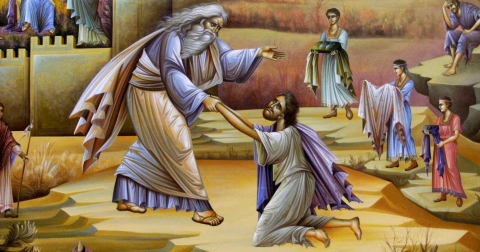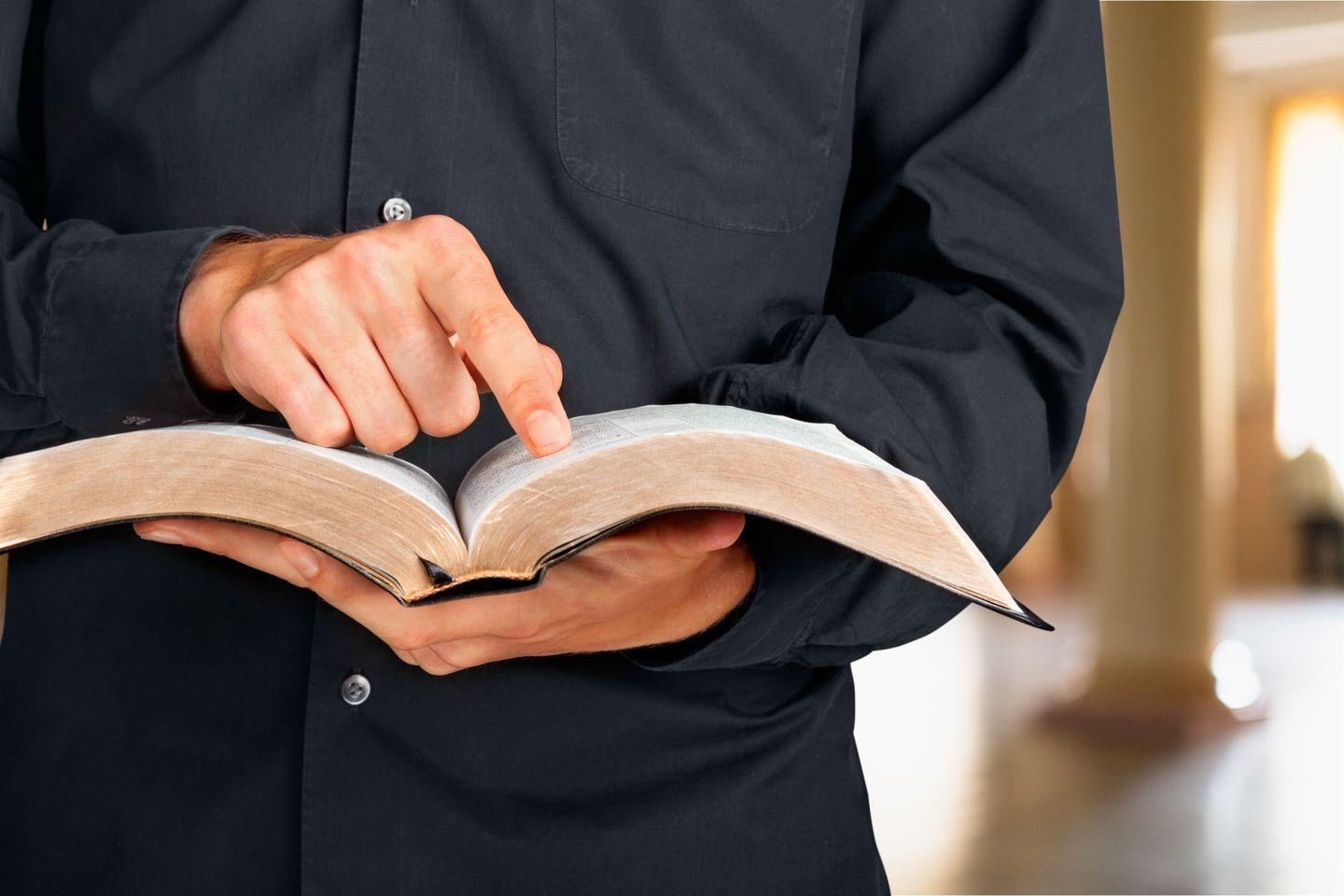Во имя Отца и Сына и Святого Духа!
Дорогие братья и сестры во Христе! Вчера, на всенощном бдении, мы с вами слышали песнопение псалма «На реках Вавилонских»… Началась постная триодь, приближаются дни Великого поста. Святая Церковь преподает нам пример покаяния и исправления, показывает пример человеческой жизни и отношения человека к Богу Отцу Небесному на примере отношения к отцу земному.
В евангельской притче о блудном сыне, которая сегодня читалась за Божественной Литургией, мы слышали, что был человек, и у него было два сына — старший и младший. И младший сын, чувствуя, что он взрослый, стал говорить отцу, чтобы он отдал ему принадлежащую ему часть имения. «о́тче, даждь ми досто́йную часть име́ния», (Лк 15:12) — сказал сын отцу своему. Он просит это для того, чтобы самому управлять своей жизнью, потому что думает, что он лучше будет распределять силы и возможности, которые ему будут даны, нежели отец. Он берет наследство и уходит в ту страну далече, где расточает все свое имение и превращается в нищего человека. Нужно понимать, что он не был врагом самому себе. Он не расточал специально свое имение, он понимал, что это его собственность, но расточил все, живя блудно.
Так и в нашей жизни. Человек часто требует себе свое и от этого лишается всего, что ему должно было быть дано и чем бы он мог обладать потом. Он отказывается от целого, беря только маленькую часть того, что, как он говорит, принадлежит ему по праву. Как сказал Преподобный Паисий Святогорец, “справедливость не в сем мире, а у Бога. И не стоит ее искать здесь на земле, ее нужно искать у Бога.” Человек, думающий, что он поступил справедливо, взяв свое, потерял все, что у него было и что могло бы и должно было у него быть.
И вот, находясь в этом состоянии обнищания, этот человек просится пасти свиней. Он не получает ни от кого никакой помощи и пропитания и питается с этими свиньями, которых пасет. До какого состояния скатывается этот гордый человек, считавший, что он лучше управит своим имением, нежели его отец! Он превращается в нищего бездомного человека, питающегося со свиньями. И вот здесь, прийдя в себя, — говорит Евангелие, — человек вспомнил, что у его отца наемники находятся в лучшем состоянии: имеют пропитание, снабжение и проживание. Он говорит пойду к отцу и скажу ему” о́тче, согреши́ на не́бо и пред тобо́ю, и уже́ несмь досто́ин нарещи́ ся сын твой, сотвори́ мя я́ко еди́ наго от нае́мник твои́ »
(Лк 15:18,19) И идет и исполняет свое покаянное желание делом. Придя к отцу, он очень медленно, не спеша, идет, стыдясь и боясь гнева отца. Но обратим внимание, что отец бежит навстречу сыну, обнимает его, воняющего свиньями, лобызает его в знак прощения, примирения и восстановления в сыновьем состоянии. Сын был принят отцом, был устроен пир, и началась новая жизнь младшего сына.
Часто мы на этом останавливаемся и не обращаем внимания на старшего сына. А старший сын пришел с работы. И услышав, что в доме пир, спросил: что это? Ему говорят: твой брат вернулся, отец устроил торжество и заколал тельца упитанного, то есть приготовил лучшую трапезу. Одел сына в лучшие одежды и надел на его руку перстень сыновний. Старший сын, опечалившись, не захотел даже войти в свой дом. Отец вышел к старшему сыну сам и на его упреки, что он не дал ему даже малого утешения за верную службу, отец ему ответил: все мое — твое. И всем, чем я обладаю, ты обладаешь тоже. Радуйся, что брат твой вернулся, будучи погибшим.
В нашей жизни мы видим человека, к сожалению, сейчас уже не часто, живущего благочестиво и исполняющего заповеди Евангелия. Когда этот человек видит, что Господь милует, прощает и благословляет грешника, то иногда в сердце этого человека зарождается зависть, огорчение и ропот. Он начинает всем сердцем возмущаться на Суды Божии. Видя пример Отца Небесного, который изображен в этой притче, мы должны понимать, что Господь приемлет всех и дождит на праведных. От нас же требуется постоянство в добре, исполнение заповедей Христовых, покаяние за свои грехи пред Отцом Небесным.
Если человек будет поминать свои грехи, каяться в них и просить прощения у Бога, не смотреть на своего соседа и не завидовать ему, а смотреть на дающего милость Господа, то он всегда будет со Христом и с Богом во веки вечные. Аминь.
In the name of the Father and the Son and the Holy Spirit!
Dear brothers and sisters in Christ! Yesterday, at the all-night vigil, you and I heard the chanting of the psalm “On the Rivers of Babylon”… The Lenten Triodion has begun, and the days of Great Lent are approaching. The Holy Church gives us an example of repentance and correction, shows an example of human life and a person’s relationship with God the Heavenly Father using the example of his relationship with his earthly father.
In the Gospel parable of the Prodigal Son, which was read today during the Divine Liturgy, we heard that there was a man and he had two sons – the eldest and the youngest. And the youngest son, feeling that he was an adult, began to tell his father to give him the part of the estate that belonged to him. “Father, give me a worthy portion of the estate,” (Luke 15:12) – the son said to his father. He asks this in order to manage his own life, because he thinks that he will better distribute the forces and opportunities that will be given to him than his father. He takes the inheritance and goes to that distant country, where he squanders all his property and turns into a beggar. You need to understand that he was not his own enemy. He did not squander his property on purpose, he understood that it was his property, but he squandered everything by living fornication.
So it is in our lives. A person often demands his own and as a result is deprived of everything that should have been given to him and that he could have later. He gives up the whole, taking only a small part of what he says is rightfully his. As the Venerable Paisius of the Holy Mountain said, “justice is not in this world, but with God. And you shouldn’t look for it here on earth, you need to look for it with God.” The man who thinks that he acted justly by taking what is his has lost everything that he had and that he could and should have had.
And so, being in this state of impoverishment, this man asks to herd pigs. He does not receive any help or food from anyone and eats with these pigs that he grazes. To what a state does this proud man descend, who believed that he would manage his estate better than his father! He turns into a poor homeless man eating with pigs. And here, having come to his senses, says the Gospel, the man remembered that his father’s mercenaries were in better condition: they had food, supplies and accommodation. He says I will go to my father and tell him, “Father, I have sinned in heaven and before you, and your son is no longer worthy to be called, make me as one of your hired servants.”
(Luke 15:18,19) And he goes and fulfills his penitential desire with action. Arriving at his father, he walks very slowly, unhurriedly, ashamed and afraid of his father’s anger. But let us note that the father runs towards his son, hugs him, stinking of pigs, kisses him as a sign of forgiveness, reconciliation and restoration to his son’s state. The son was accepted by his father, a feast was arranged, and a new life for the youngest son began.
Often we stop there and don’t pay attention to our eldest son. And the eldest son came home from work. And hearing that there was a feast in the house, he asked: what is this? They tell him: your brother has returned, your father arranged a celebration and slaughtered a well-fed calf, that is, he prepared the best meal. He dressed his son in the best clothes and put a filial ring on his hand. The eldest son, saddened, did not even want to enter his house. The father went out to his eldest son himself and in response to his reproaches that he did not give him even a little consolation for his faithful service, the father answered him: everything that is mine is yours. And everything that I have, you have too. Rejoice that your brother returned after being lost.
In our life we see a person, unfortunately, now not often, living piously and fulfilling the commandments of the Gospel. When this person sees that the Lord has mercy, forgives and blesses a sinner, then sometimes envy, grief and grumbling arise in the heart of this person. He begins to be indignant with all his heart at the Judgments of God. Seeing the example of the Heavenly Father, who is depicted in this parable, we must understand that the Lord accepts everyone and will rain on the righteous. What is required of us is constancy in goodness, fulfillment of the commandments of Christ, repentance for our sins before the Heavenly Father.
If a person remembers his sins, repents of them and asks for forgiveness from God, does not look at his neighbor and does not envy him, but looks at the Lord who gives mercy, then he will always be with Christ and with God forever and ever. Amen.


